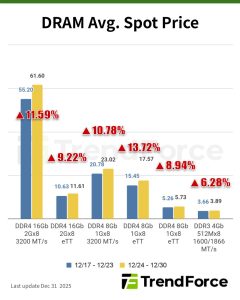Popular Keywords
- About Us
-
Research Report
Research Directory
Semiconductors
LED
Consumer Electronics
Emerging Technologies
- Selected Topics
- Membership
- Price Trends
- Press Center
- News
- Events
- Contact Us
- AI Agent
About TrendForce News
TrendForce News operates independently from our research team, curating key semiconductor and tech updates to support timely, informed decisions.
- Home
- News
[News] China Reportedly Questions Tencent, ByteDance on Buying NVIDIA H20 Instead of Domestic Chips

According to Reuters, sources say the Cyberspace Administration of China has summoned domestic companies—including Tencent, ByteDance, Baidu, and several smaller tech firms—over their purchases of Nvidia’s H20 chips, asking them to justify the purchases and expressing concerns about potential information security risks. Citing Bloomberg, the report adds that Chinese authorities have urged companies to avoid using the H20, particularly for government-related purposes.
It remains unclear whether Chinese companies have been instructed to halt purchases of Nvidia’s H20 entirely. However, as Reuters notes, even without a formal ban, the concerns raised by authorities could jeopardize NVIDIA’s recently regained access to the Chinese market. Bloomberg, citing sources, notes that Beijing’s broader push may also affect sales of AI accelerators from AMD.
China Steps Up Domestic AI Chip Push Amid Reported Efforts to Curb H20 Purchases
Meanwhile, Reuters notes that China is stepping up efforts to develop domestic AI chip alternatives, with companies such as Huawei working on processors that can match the H20’s performance.
According to TrendForce, domestic Chinese chipmakers—such as Huawei—are projected to boost their market share to 40% in 2025, nearly on par with imported chips, supported by strong government policies promoting homegrown AI processors.
Scaled-Down Blackwell Chip for Chinese Market?
While Chinese authorities are scrutinizing domestic purchases of the H20, attention is also turning to whether a scaled-down version of NVIDIA’s Blackwell chip might enter the Chinese market. On Monday, U.S. President Donald Trump suggested he might permit NVIDIA to sell this reduced version of its advanced Blackwell chip in China, according to Reuters. The report notes that Trump said Jensen Huang has developed a variant with 30%–50% of its capabilities removed—likely intended for the Chinese market—and that he is weighing whether to approve its sale.
Earlier this year, U.S. authorities effectively banned sales of the H20 to China but reversed the decision in July, as Reuters notes. Last week, the Trump administration confirmed an unprecedented deal with NVIDIA and AMD, under which the companies agreed to give the U.S. government 15% of revenue from sales of NVIDIA’s H20 and AMD’s MI308 in China, Reuters adds.
Meanwhile, according to Chinese media outlet ijiwei, NVIDIA was demanded by Chinese authorities to explain potential security risks and possible backdoors in its H20 chips last month, underscoring the authorities’ heightened scrutiny of the U.S. company.
Read more
- [News] Trump Might Approve 50% Scaled-Down NVIDIA Blackwell for China — Still Beats All Local Chips
- [News] NVIDIA, AMD Make Historic Deal: Reportedly Pay 15% of China Sales for H20, MI308 Export Licenses
- [News] Chinese Regulators Reportedly Summon NVIDIA Over H20 Chip Backdoor Security Risks
(Photo credit: Tencent)





